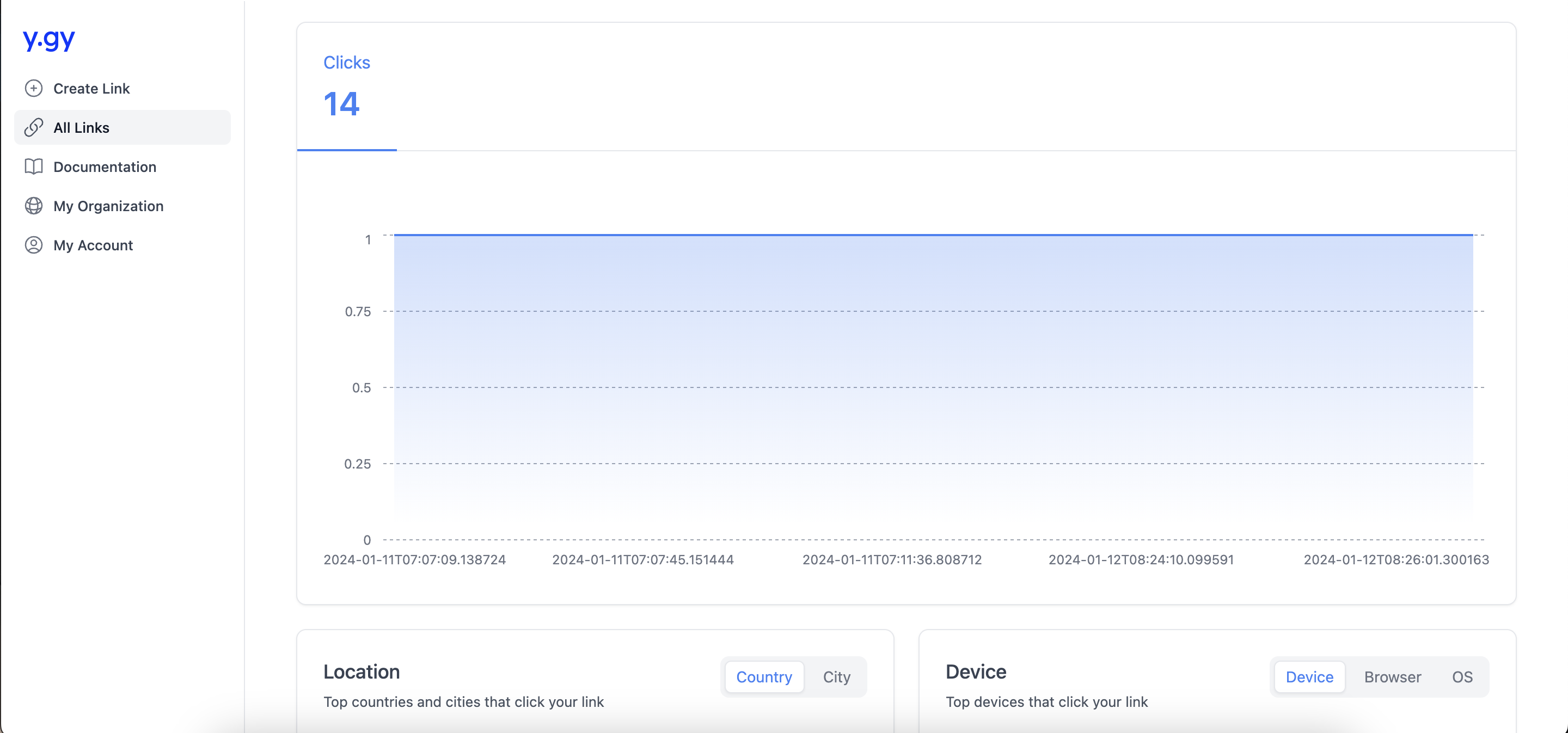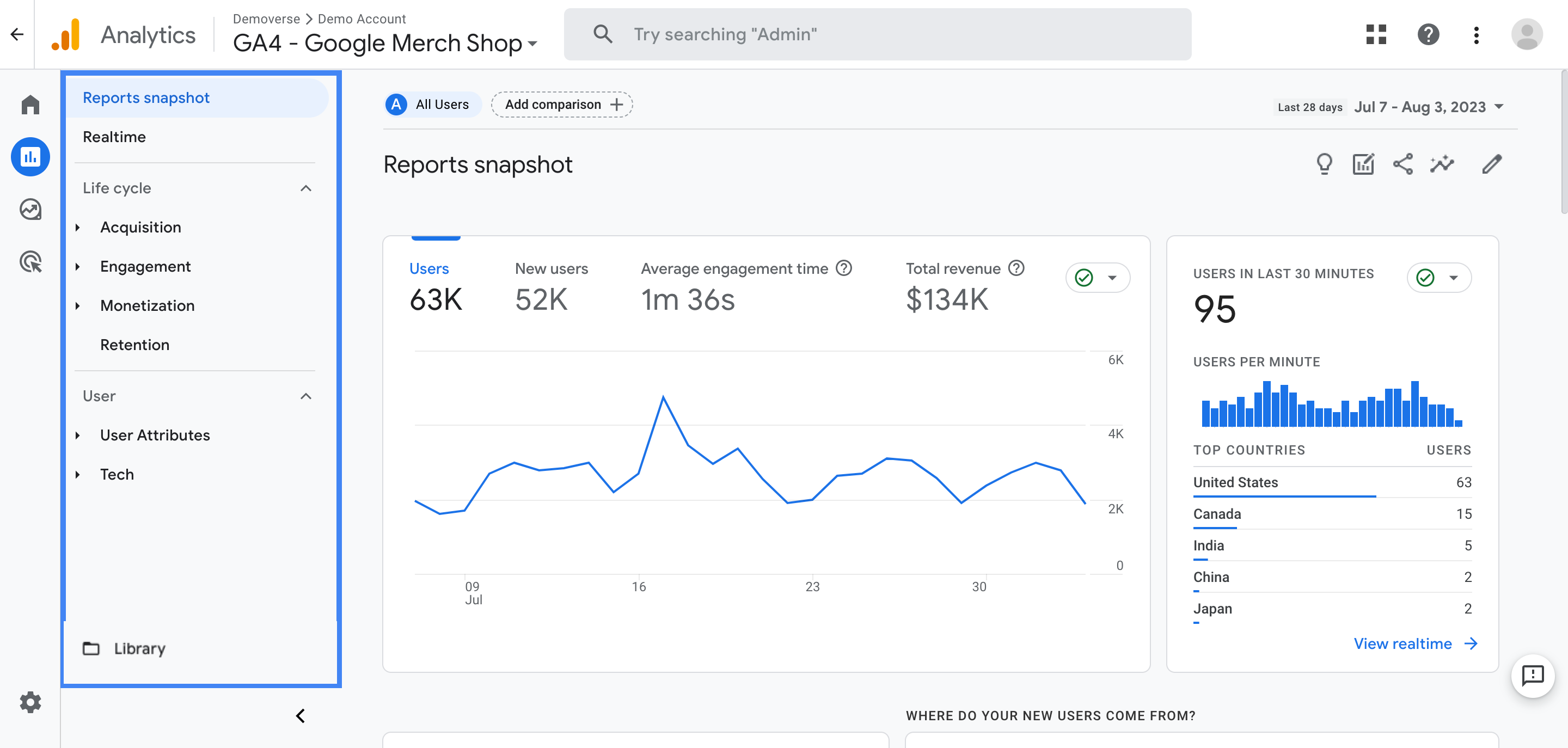When it comes to online marketing and managing your digital
presence, it's super important to have robust analytics for your
link management. In this article, we'll discuss how to combine y.gy, our
emerging link management platform, and Google Analytics,
the behemoth of web analytics. Used well together, they form a
symbiotic relationship that not only transforms how we handle
links but also elevates our understanding of user behavior and
engagement.
y.gy: Elevating Link Management
Y.GY is what we've built: a platform that goes far beyond
traditional link shortening. We've striven to build a
best-in-class link management experience, far better than
tinyurl, bitly, and all the others. Its intuitive interface and
user-friendly design make link management an effortless
experience, and we've built it to have deep features like a
webhooks, a full API, spam protection
, traffic analytics, user activity tracking, custom open graph
tags, and more. From easy link creation to customizable QR
codes, y.gy streamlines the link-sharing process.
Since this article is about y.gy and Google Analytics, we should
talk about y.gy's analytics suite. The analytics functionality
that we expose under the Starter
plan extends beyond mere click counts. We provide detailed
insights into user behavior, demographics, and engagement
trends. Our anaytics digests are designed for refining,
data-driven marketing approaches. We built our link shortener
for marketers and engineers to gain deeper understandings of
their audiences.
Additionally, y.gy's webhooks
provide users with real-time data on usage, firing webhook
events on every single click. This allows any y.gy user to get
real-time, 1:1 data on every single link click -- and most
importantly, every single metadata detail available about the
person who clicked the link. This allows you to seamlessly
integrate your y.gy links with your broader analytics and user
tracking systems.

The Power of Google Analytics
Google Analytics, a household name in web analytics and
tracking, empowers businesses and website owners to track and
analyze their online performance comprehensively. Developed by
Google almost twenty years ago, this tool provides a wealth of
information about website visitors, their behavior, and the
effectiveness of online marketing efforts. By implementing a
tracking code widget on web pages, Google Analytics captures
data on user interactions, such as page views, clicks, and
conversions. It goes beyond mere traffic statistics, offering
detailed insights into audience demographics, geographic
locations, and devices used. Google Analytics is well-known for
being the most comprehensive, large-scale web analytics service
today, far ahead of smaller competitors like Plausible.
Now, this raises a significant question -- given that
y.gy offers its own analysis, is there merit in utilizing
Google Analytics? If so, what additional insights does
Google Analytics bring to the table?

Thinking About y.gy vs. Google Analytics
y.gy is first and foremost a link shortening platform. Its
strength is in offering customizable short links, streamlining
campaigns with concise URLs tailored for different channels and
audiences. Google Analytics is, of course, a totally different
product with a very different goal: to provide comprehensive
analytics, encompassing geographic data and engagement metrics.
The key distinction lies in the timing of insights, with y.gy
providing real-time data and GA4 (Google Analytics 4) delivering
more complex reports over the long-term and most usefully in
retrospect.
-
y.gy for Swift Analyticsy.gy excels in providing immediate insights into link performance, offering real-time data on how content resonates with the audience. The platform's user-friendly interface enables marketers to customize campaign URLs based on various parameters, facilitating quick adjustments for optimal engagement. The y.gy platform allows the user to configure any number of links — hundreds of thousands, if desired — and access the data of all those links programmatically, so granular, real-time feedback is possible over thousands of links at once, giving you stellar insight into the performance of a campaign in every detail.
-
Google Analytics for In-Depth UnderstandingGoogle Analytics provides views and reports that range from aggregate to detailed; the GA4 interface is famously detailed and (occasionally) difficult to understand. The data is not accessible as straightforwardly from an API perspective, and users will need to spend significant time configuring their own Google Analytics dashboards. Google Analytics has useful integrations with other services like Google AdWords and Google Search Console, which enables some additional tracking on a Google traffic cohort basis.
Mastering Campaigns by Combining y.gy and Google Analytics
-
Consise Asthetic Link: While y.gy indeed offers extensive analysis, it's crucial to acknowledge its primary role as a link shortener. In contrast, Google Analytics requires the addition of UTM Parameters to the destination URL for campaign tracking, resulting in lengthy and visually unappealing links. A link shortener, such as y.gy, maintains UTM Parameters while ensuring the URL remains concise and aesthetically pleasing. You might consider using y.gy to shorten your links and hide the UTM parameters while using Google Analytics (or any other analytics product, like Plausible or Branch ) behind the scenes.
-
Holistic Link Tracking and Analytics: The combination of y.gy and Google Analytics provides a comprehensive view of link performance, blending immediate impact insights with nuanced engagement details. This dual approach allows for both swift adjustments and strategic decisions based on thorough analytics.Using y.gy allows you to track immediate analytics such as click count, demographics, and device details. You can use y.gy webhooks and click-level analytics to have real time reporting on how your shortened links are performing, while hooking up Google Analytics (GA4) to your Google AdWords and Google Search Console to get a different, actionable view into your marketing campaigns there.
-
Improved Campaign Understanding: Utilizing y.gy provides insights through click-through rates to assess the effectiveness of your campaign and gain basic information about the geographical locations, device types, referrers, etc. that account for most of your traffic. However, click-through rates alone may not cover all aspects. GA4 complements this by offering a deeper analysis of website traffic and demographics, revealing which referrers and channels were more successful in reaching specific audiences.
The Conclusion
In conclusion, the synergy between y.gy and Google Analytics
creates a dynamic duo that allows you to manage and analyze link
click performance both at the highly detailed and overarching
aggregate views. While y.gy provides real-time analytics,
offering insights into user behavior and engagement patterns,
Google Analytics contributes to long-term data analysis,
delivering detailed reports for a deeper understanding of
campaign impact. Integrating both tools allows marketers to
harness the immediate impact of links along with nuanced
engagement details, providing a holistic view of link
performance. With y.gy's emphasis on concise and aesthetic link
presentation, combined with the in-depth analytics of Google
Analytics, users can streamline their workflow, gain
comprehensive campaign insights, and make informed decisions for
optimal marketing strategies. This collaboration represents a
powerful fusion of immediate results and intricate analysis,
giving you a best-in-class combination of tools for link and
traffic management.
